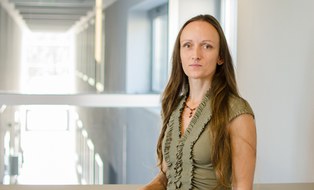Education at the ILK 2023
The Lightweight Eingineering study programme was established at the ILK in 1997 and since then has played a decisive role in global mechanical engineering. Graduates are characterised by a broad range of basic knowledge as well as application-oriented specialist knowledge, particularly in the areas of modern materials, material and structural mechanics, simulation, design and production technology as well as economic-ecological product evaluation.
In order to achieve an in-depth insight into the teaching methods and application-oriented education at the ILK, graduate engineer Leon Schröder, who recently successfully completed his studies, was interviewed. His personal experiences and insights not only provide an overview of what is taught at the ILK, but also how it prepares students for the challenges of their educational journey and modern industry.
The following interview has been translated from German into English.
Three questions for Alumnus Dipl.-Ing. Leon Schröder
Perhaps you would like to briefly describe your studies. What motivated you to study mechanical engineering? Did your current study/career choice already mature at school? Why Dresden in particular? And how did you choose your degree programme?
I actually wanted to study psychology. However, my FSJ [Voluntary social year] in paediatric and boys' psychiatry showed me that something technical might be the better path. I only really understood what you really do in mechanical engineering during my studies - that could have backfired. As a young person, I would have liked more intensive career preparation from my school. I decided to study lightweight engineering because I particularly enjoyed the subjects of materials technology and engineering mechanics during my foundation degree. I saw lightweight engineering as a good opportunity to combine these subjects.
Are you happy with all the decisions you have made? With hindsight, what would you have done differently? What would you recommend to first-year students to prepare them for their studies in general and for Mechanical Engineering (Lightweight Engineering) in particular?
Looking back, I am glad I made the choices I did, although many of the opportunities that came my way during my studies were serendipitous. I would advise first-year students to network early and gain practical experience. For example, I worked as a student assistant in the lightweight engineering group at the ILK and was able to apply the knowledge I had gained in lectures directly in practice. This makes what can be a very dry study routine more exciting, you gain valuable experience and you can earn some extra money at the same time. Even if it makes your studies take a little longer, it's worth it.
What practical and/or international experience did you gain during your degree programme and how did it help you with your studies?
In my case, my position as a student assistant at the ILK and the close contact with Dr Sebastian Spitzer provided me with numerous opportunities for further professional and personal qualification. One example is my participation in the German-Korean Junior Forum in Busan, where I was able to advocate for stronger international cooperation as part of the ‘Energy Security and Sustainable Energy’ working group.
If you have any questions or concerns regarding study matters, please contact:
 © Diana Wolfrum/ILK
© Diana Wolfrum/ILK
Romy Schneider
Department for study affairs
Send encrypted email via the SecureMail portal (for TUD external users only).
Institute of Lightweight Engineering and Polymer Technology
Visitors Address:
DÜR, Floor 1, Room 68 Holbeinstr. 3
01307 Dresden
Deutschland
Office hours:
- Monday to Friday:
- 09:00 - 11:30
- 9.00 am - 11.30 am
- 12:30 - 14:30
- 12.30 pm - 2.30 pm
currently only digital, no visitors!

